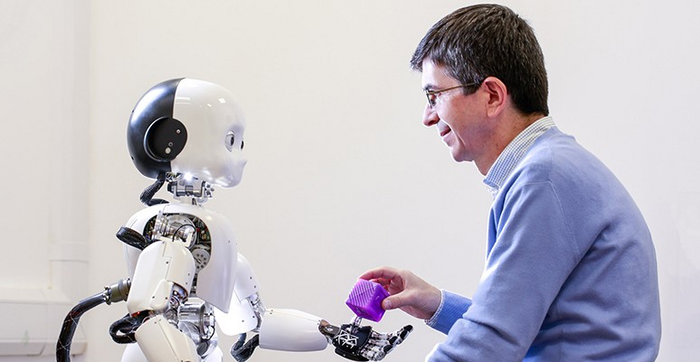A team of experts at the University of Manchester has been awarded major funding to help design smarter robots that will have more meaningful dialogue with humans after developing improved insight into our inner feelings through language.
The European Research Council (ERC) has awarded Professor Angelo Cangelosi, co-director of the Manchester Centre for Robotics and AI, a total of €2.5 million (£2.2 million) as part of the eTALK project.
The University of Manchester research team will combine expertise in AI and psychology to focus on the fact that smart machines still only understand about third of the meaning of human language.
To progress their ability to understand humans more fully, the robots will act as “tutors” to help children better understand numerical and abstract concepts.
This in turn will help robots to engage more meaningfully with older generations of humans.
Angelo Cangelosi, Professor of Machine Learning and Robotics at the University of Manchester, said that language is the most natural means of communication among people to talk about and share experiences – and for robots to understand and communicate with us.
For example, humans use concrete words to describe objects and their features (e.g. ‘Look at this red pen’) and to talk about actions and events (‘I write with the pen’).
However, we most commonly use abstract words to describe social situations and relationships (such as, ‘Mary likes John’), emotional states (‘I wish you happiness’), and numbers and quantities (1, 2, 10, or ‘some’, ‘many’).
Professor Cangelosi said:
“In fact, the great majority – a total of 72 per cent – of words we use are abstract words; but today’s robots can only understand the concrete words.
“So, how can we have meaningful interaction with robots if they cannot understand most of the words we use?”
To meet this challenge, the ERC Advanced eTALK project will take direct inspiration from the way children and adults use and learn abstract words – and use methods from AI and psychology to develop a new generation of robots capable of communicating with people about numbers, internal feelings and other abstract words.
Professor Cangelosi added:
“These robots will then be tested as tutors for helping children understand numerical and abstract concepts, and as robot companions to help older people have meaningful conversations and help them in everyday life.”
Image: University of Manchester




